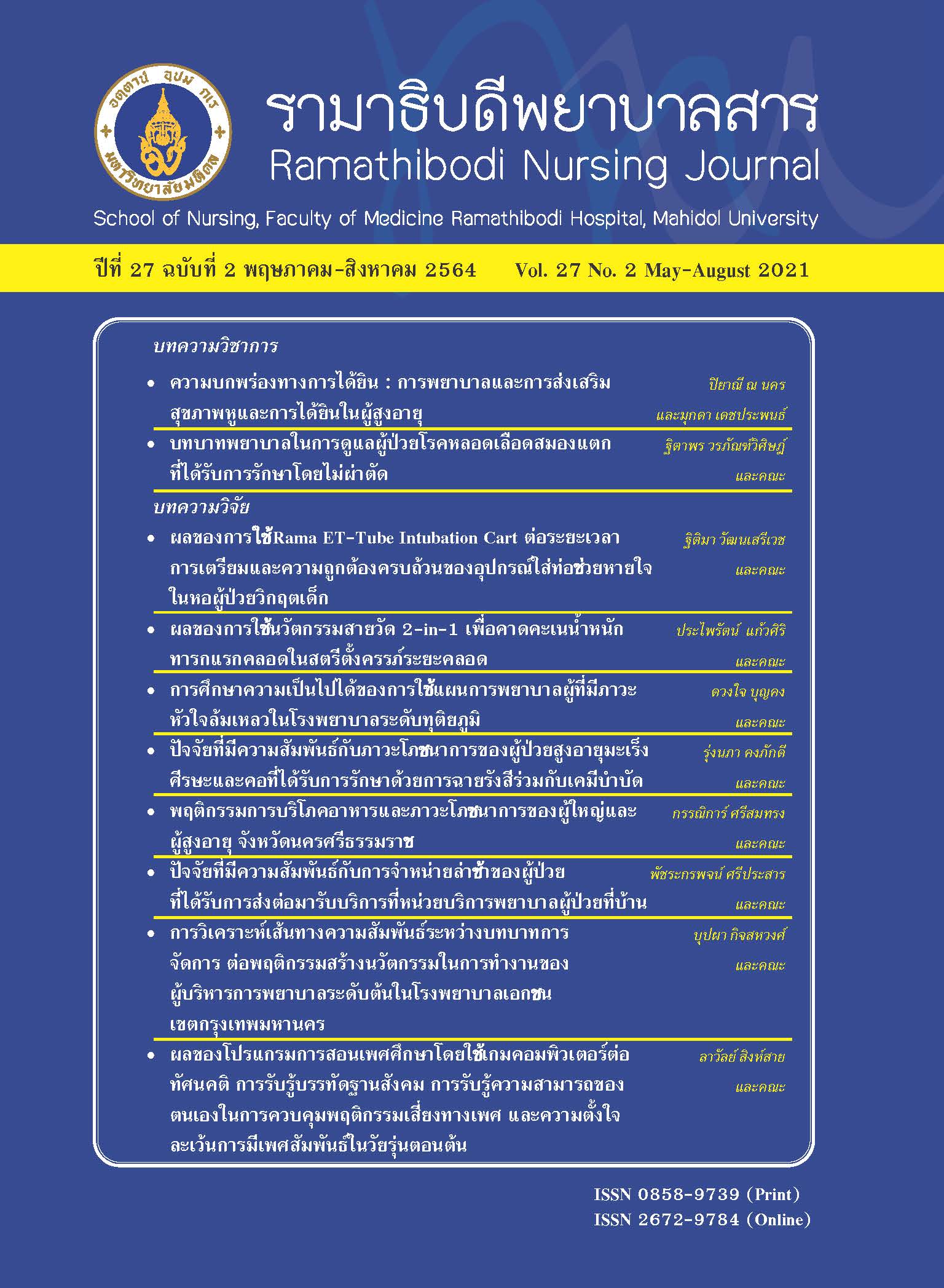Effect of Using “Rama ET-Tube Intubation Cart” on Duration, Accuracy and Completion of Prepared Intubation Equipment in Pediatric Intensive Care Unit
Main Article Content
Abstract
This experimental research with a one-group crossover design aimed to investigate the effect of using a Rama ET-tube intubation cart on the duration, accuracy,and completion of prepared intubation equipment in a pediatric intensive care unit. The sample group was recruited by purposive sampling. The group includes 30 nurses in a pediatric intensive care unit, Ramathibodi Hospital. The instruments consisted of the
Rama ET-tube intubation cart, which was created using the design thinking process to prepare equipment for endotracheal intubation in children and was sorted according to the age and weight of patients. Data collection instruments included the demographic data questionnaire, time recording form, a list of devices used for endotracheal intubation,and a stopwatch. The method of preparation was random as usual nursing care or the Rama ET-tube intubation cart. Data were analyzed using descriptive statistics, repeated
measures ANOVA, and chi-square statistics. The results of this study revealed that the mean duration of preparing equipment using the RAMA ET-tube intubation cart was significantly shorter than usual nursing care. With chi-square analysis, it was found that the RAMA ET-tube intubation cart was significantly more accurate and complete than usual nursing care.
Keywords: ET-tube intubation cart, Duration, Accuracy and completion, Critically ill
pediatric patient
Article Details
บทความ ข้อมูล เนื้อหา รูปภาพ ฯลฯ ที่ได้รับการตีพิมพ์ในรามาธิบดีพยาบาลสาร ถือเป็นลิขสิทธิ์ของวารสาร หากบุคคลหรือหน่วยงานใดต้องการนำทั้งหมดหรือส่วนหนึ่งส่วนใดไปเผยแพร่หรือเพื่อกระทำการใด ใด จะต้องได้รับอนุญาตเป็นลายลักษณ์อักษรจากรามาธิบดีพยาบาลสารก่อนเท่านั้น
References
Tayal VS, Riggs RW, Marx JA, Tomaszewski CA,Schneider RE. Rapid-sequence intubation at an emergency
medicine residency: success rate and adverse events during a two-year period. Acad Emerg Med. 1999;6(1):31-7.
Sagarin MJ, Chiang V, Sakles JC, Barton ED, Wolfe RE,Vissers RJ, et al. Rapid sequence intubation for pediatric
emergency airway management. Pediatr Emerg Care.2002;18(6):417-23.
Kerrey BT, Rinderknecht AS, Geis GL, Nigrovic LE,Mittiga MR. Rapid sequence intubation for pediatric
emergency patients: higher frequency of failed attempts and adverse effects found by video review. Ann Emerg Med.2012;60(3):251-9.
Stollings JL, Diedrich DA, Oyen LJ, Brown DR. Rapidsequence intubation: a review of the process and
considerations when choosing medications. Ann Pharmacother. 2014;48(1):62-76.
Gooch MD, Roberts E. Changing the emergency department’s practice of rapid sequence intubation to
reduce the incidence of hypoxia. Adv Emerg Nurs J.2017;39(4):266-79.
Schmidt SK, Brou L, Deakyne SJ, Mistry RD, Scott HF.Frequency and characterization of tracheal intubation
adverse events in pediatric sepsis. Pediatr Crit Care Med.2018;19(2):80-7.
Mulcaster JT, Mills J, Hung OR, MacQuarrie K, Law JA,Pytka S, et al. Laryngoscopic intubation: learning and
performance. Anesthesiology. 2003;98(1):23-7.
Wang CH, Chen WJ, Chang WT, Tsai MS, Yu PH, Wu YW, et al. The association between timing of tracheal
intubation and outcomes of adult in-hospital cardiac arrest:A retrospective cohort study. Resuscitation. 2016;
:59-65.
Matettore A, Ramnarayan P, Jones A, Randle E, Lutman D, O’Connor M, et al. Adverse tracheal intubationassociated events in pediatric patients at nonspecialist centers: a multicenter prospective observational study.Pediatr Crit Care Med. 2019;20(6):518-26.
Chacaroun S, Borowik A, Morrison SA, Baillieul S, Flore P, Doutreleau S, et al. Physiological responses to two
hypoxic conditioning strategies in healthy subjects. Front Physiol. 2017;7:1-20.
Ericka P. Simpson. Neurologic complications of systemic disease. In: Loren A. rolak, editor. Neurology secrets. 5thed. St. Louis: Mosby; 2011.353-73.
Souza N, Carvalho WB. Complications of tracheal intubation in pediatrics. Rev Assoc Med Bras.
;55(6):646-50.
Satyapal VM, Rout C, Sommerville TE. Errors and clinical supervision of intubation attempts by the inexperienced.SAJAA. 2018; 24:1-7.
Rousek JB, Hallbeck MS. Improving medication management through the redesign of the hospital code cart
medication drawer. Hum Factors. 2011;53(6):626-36.
Shultz J, Davies JM, Caird J, Chisholm S, Ruggles K,Puls R. Standardizing anesthesia medication drawers using
human factors and quality assurance methods. Can J Anaesth. 2010;57(5):490-9.
Jacquet G. The Emergency Department Crash Cart: A systematic review and suggested contents. World J Emerg Med. 2018;9:93.
Crimlisk JT, Doherty MM, Fernandes E, Leblanc E,Guarino R, Costello KV. Adult code cart redesign: Clinical
implications. Nursing. 2018;48(7):58-61.
Bjurström MF, Bodelsson M, Sturesson LW. The difficult airway trolley: a narrative review and practical guide.
Anesthesiol Res Pract. 2019; 2019:6780254.
Loiselle J, Ruddy RM, Wiley JF, editors. Text book of pediatric emergency procedures. 2nd ed. Philadelphia:
Lippincott Williams and Wilkins; 2008.
Kidjawan N. Design Thinking Process: New Perspective in Thai Healthcare System. JTNMC. 2018;33(1):5-14.
Cox M. Design thinking in healthcare [internet]; 2015[cited 2019 Sep 3]. Available from: https:// www.
researchgate.net/publication/281408556_ Design_Thinking_in_Healthcare
Kelley D. About IDEO [internet]; 2018 [cited 2019 Sep3]. Available from: https://www.ideo.com/about
Sirisak N, Jayanton P. Designs for cross-over trials.Naresuan University Journal.2008;16(3):255-62.
(in Thai)
Benner, P. From novice to expert: Excellence and power in clinical nursing practice. Menlo park: Addison-Wesley;1984.
Healthcare Accreditation Institute (Public Organisation).Standard manual HA 19[internet]; 2019 [cited 2020 April8]. Available from: https://www.ha.or.th/Backend/fileupload/AS+RS+DHSA/Attach/SD-ACD-015-00
%20HA%20Standards%20Implementation%20Manual_190719.pdf


